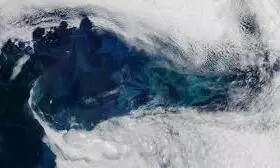
Atlantic Ocean’s current system faces imminent collapse by 2030
text_fieldsA new scientific study has sounded an urgent alarm: the Atlantic Meridional Overturning Circulation (AMOC), a vital ocean current system that plays a key role in regulating the global climate, is on the verge of collapsing.
According to CNN, this critical system could fail as soon as the late 2030s, primarily due to human-induced climate change.
The potential collapse of the AMOC would have profound and far-reaching consequences. Such a shutdown would lead to dramatic changes in global weather patterns, resulting in more extreme weather events, altered precipitation, and significant disruptions to agriculture.
Europe and North America could face substantial temperature drops, while regions like the Amazon rainforest might experience severe changes in seasonal weather patterns.
"This is really worrying," stated Rene van Westen, a marine and atmospheric researcher at the University of Utrecht in the Netherlands and co-author of the study. He explained to CNN that the negative effects of anthropogenic climate change, such as increased heatwaves, droughts, and flooding, will continue unabated.
If the AMOC collapses on top of these ongoing issues, the global climate will become even more distorted.
The implications for ecosystems and human societies are dire. Marine life that depends on the AMOC for nutrient distribution will be at risk, and coastal communities will face heightened threats from rising sea levels and more intense storms.
Stefan Rahmstorf, a physical oceanographer at Potsdam University in Germany, who was not involved in the latest research, emphasized the gravity of the situation: "An AMOC collapse is a really big danger that we should do everything we can to avoid."
Scientists are urging immediate and drastic action to mitigate climate change and possibly prevent this catastrophic tipping point.





